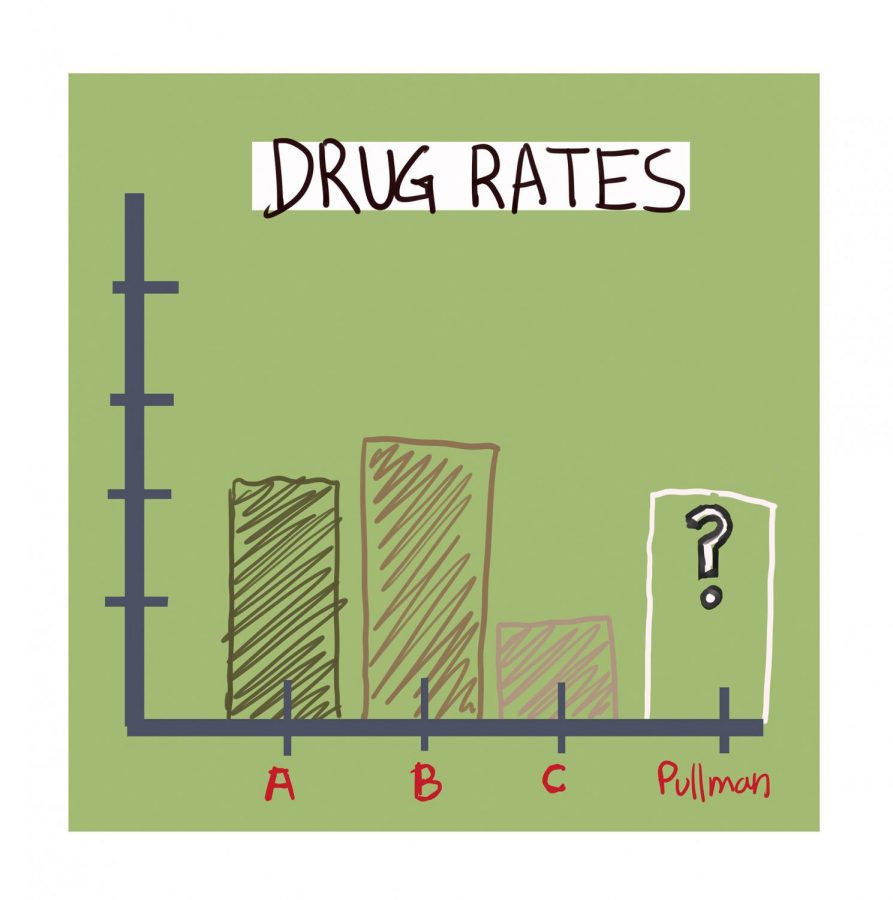Whitman County needs a drug taskforce
Heroin is a problem, therefore law enforcement should focus on it
NATALIE BLAKE | DAILY EVERGREEN ILLUSTRATION
Pullmant needs to do something about heroin, a task force is needed.
January 27, 2020
Whitman County needs to double down on its efforts to fight opioid addiction and create a Whitman County opioid task force to respond to the growing opioid problem.
“Illegal heroin [has] seen an increase in in this area,” Gary Jenkins, Pullman Police Department chief of police, said. “It’s concerning, the amount that we have seen.”
Heroin usage is easy to ignore. It is viewed as a moral failing on behalf of its users, something that they decided to start doing, and that isn’t wrong. Heroin, as well as opioid addicts are doing something dangerous not only to themselves but to their community as well.
However, as much as this perspective feels correct, it overlooks the critical component of what makes people seek heroin in the first place: Substance Abuse Disorders.
“It is considered a chronic relapsing medical condition. It is a manageable disease,” Jessica Blose, Washington State opioid treatment authority, said.
Opioid use is a vice and a disease. Then again, so is alcoholism. When someone has an alcohol problem, the response isn’t to throw them in jail or tell them they have a moral failing. The response is to acknowledge they have a problem and to then help them solve that problem.
The only way to fight opiate use is to treat it like the manageable disease it is, and to its credit Whitman County is taking up the challenge.
According to Jenkins, Pullman police are trained with Narcan, a lifesaving drug administered to someone during an opioid overdose.
Whitman County has a drug court that helps addicts get the help they need. There is also a Quad Cities Drug Trafficking Task Force and Pullman has had successful medicinal clinics that help fight opiate addiction.
Whitman County and Pullman have made commendable and genuine strides in the right direction when comes to fighting this disease.
Despite this progress, Whitman County has more it needs to do.
WSU Clinical Assistant Professor of history Ken Faunce focuses his research on the history of drugs.
“We see waves like this, things go up, things go down, then they go up again,” Faunce said. “However, more people are using opioids, not just on the Palouse, but nationwide.”
Whitman County is doing the right thing, but the opioid addiction it is trying to face is still winning.
That is why Whitman County should form an official opioid task force to combat a losing battle against this disease.
“It can be a really good framework to bring different stakeholders together and decide who should be at the table whether it’s the police, EMS, or the fire department who will respond,” Blose said. “We believe that each community is the best expert on what they need.”
Along with getting people off heroin, this task force should help rehabilitate people to live productive lives for them and their community. The task force should be willing to make considerable investments in rehabilitation centers and better oversight of opioid prescription.
Despite their good design and purpose, taskforces for fighting opioids sometimes have problems.
“It does happen sometimes where you have a crooked system in the bigger cities, but that’s because there’s not as much oversight as there should be,” Faunce said.
While this crookedness found in certain task forces is something to watch out for, it makes no sense to not provide the medical care for your community just because big cities have problems.
With new agencies come new responsibilities both to and from the community. Any task force needs to actively seek public opinion and consensus about the actions it plans on taking, and any community needs to hold that task force accountable if it fails its job.
Fighting Whitman County’s growing opioid problem is a moral and medical responsibility that needs to be undertaken.
Whitman County needs an opioid task force.









